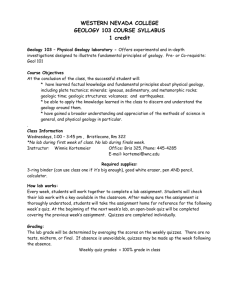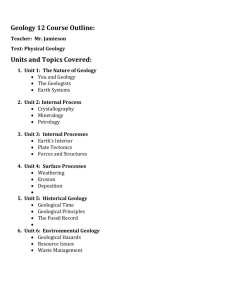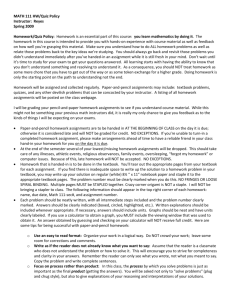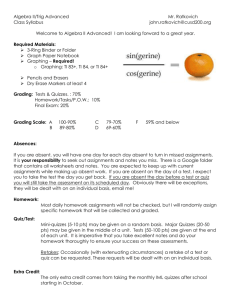Geology 101 - Department of Geological Sciences
advertisement
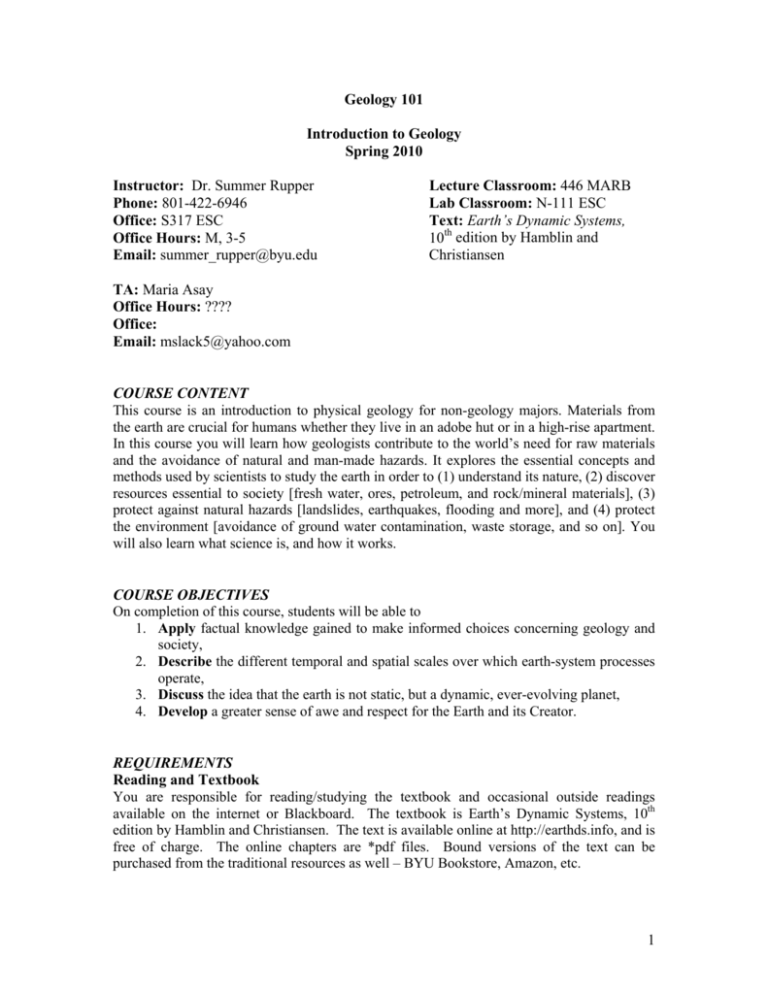
Geology 101 Introduction to Geology Spring 2010 Instructor: Dr. Summer Rupper Phone: 801-422-6946 Office: S317 ESC Office Hours: M, 3-5 Email: summer_rupper@byu.edu Lecture Classroom: 446 MARB Lab Classroom: N-111 ESC Text: Earth’s Dynamic Systems, 10th edition by Hamblin and Christiansen TA: Maria Asay Office Hours: ???? Office: Email: mslack5@yahoo.com COURSE CONTENT This course is an introduction to physical geology for non-geology majors. Materials from the earth are crucial for humans whether they live in an adobe hut or in a high-rise apartment. In this course you will learn how geologists contribute to the world’s need for raw materials and the avoidance of natural and man-made hazards. It explores the essential concepts and methods used by scientists to study the earth in order to (1) understand its nature, (2) discover resources essential to society [fresh water, ores, petroleum, and rock/mineral materials], (3) protect against natural hazards [landslides, earthquakes, flooding and more], and (4) protect the environment [avoidance of ground water contamination, waste storage, and so on]. You will also learn what science is, and how it works. COURSE OBJECTIVES On completion of this course, students will be able to 1. Apply factual knowledge gained to make informed choices concerning geology and society, 2. Describe the different temporal and spatial scales over which earth-system processes operate, 3. Discuss the idea that the earth is not static, but a dynamic, ever-evolving planet, 4. Develop a greater sense of awe and respect for the Earth and its Creator. REQUIREMENTS Reading and Textbook You are responsible for reading/studying the textbook and occasional outside readings available on the internet or Blackboard. The textbook is Earth’s Dynamic Systems, 10th edition by Hamblin and Christiansen. The text is available online at http://earthds.info, and is free of charge. The online chapters are *pdf files. Bound versions of the text can be purchased from the traditional resources as well – BYU Bookstore, Amazon, etc. 1 Before reading a chapter, read the “Major Concepts” carefully. These will help you focus on the important concepts as you read. Next, study each figure and read the captions – geology is a visual science and this will greatly improve your comprehension of the text. Then read the chapter, keeping in mind the key points you gleaned earlier, and take notes. Test your understanding by answering the “Review Questions” at the end of the chapter. Finally, take the online quiz for the chapter. Quizzes There will be a quiz twice a week on the assigned reading. Before coming to class, when we are starting a new chapter, read the assigned chapter in the textbook (or on-line reading) and take a quiz via Blackboard. Quizzes will be available 9am until 5pm the following day. There are 14 quizzes, each worth 5 points. You have 20 minutes to complete each quiz. Be sure to include enough time to save your file to Blackboard. Your two lowest quiz scores will be dropped before grades are calculated. Quizzes are open book/notes. They are NOT open friends! Note: Use Firefox or Internet Explorer 6 as IE 7 will often cause you to drop (not save) quizzes. When you look up your score in Blackboard and you see an “!” you exceeded your time limit and no credit was given. If you see a padlock, you quit before saving (were using IE7, your connection was lost, or whatever). On the first two quizzes, if you get a “!”, contact the TA. After that, you know you have to allow time to save. If you have a padlock or other quiz problems contact the TA via e-mail. If you receive a couple of padlocks, use a different browser or take the quizzes using a campus computer with a reliable connection. Important: You are responsible to take the steps necessary to avoid an “!” or a padlock and ensure you successfully complete the quiz. After the first two quizzes, any problems resulting in a missed quiz will count as a zero on that quiz. If problems arise due to professor, TA, or university errors, you will not be penalized and we will correct the problem. Class Attendance Attendance in lecture is expected. Lectures are the core of the class and you are responsible for information covered therein. The lectures will cover points that are not in the textbook. The lectures will help you figure out which subtopics are the most important to study. Importantly, there will be numerous writing assignments, group discussions, and projects during lecture that count towards your participation grade. These activities will be done during class and handed in before class ends. If you miss these in-class assignments, you can not make them up later. Participation A large portion of your grade will come from a sincere effort to actively participate in activities during lecture. These activities will not be announced until lecture starts, so please make sure you do not miss class. There will be a total of 15 in-class assignments throughout the semester. These are graded for “credit” only. In other words, if you participated and 2 hand in something thoughtful, you receive full credit. If you are absent or turn in something that shows little effort, you receive no credit. Three of the lowest in-class assignments will be dropped. Importantly, you will not be penalized for not participating in general class discussions. Some people are far more comfortable asking questions and contributing to lectures than others. Activities that are graded will be individual or in small groups. Exams There are three exams. Two midterms consisting of 40-50 questions (multiple choice, matching, and/or true-false), and a comprehensive final consisting of approximately 100 questions. There are two parts to the exam: Part I: The midterms will be taken in the testing center, and will be offered over a two day period. This part of the exam will be worth 100 points. The final will be taken in class, and the first part of the exam will be worth 200 pts. Part II: On the lecture day following the midterms, you will be given 25 minutes of class-time to retake the exam with your neighbors, notes, and textbook. This “second attempt” will be worth 10 points. The “second attempt” on the final will be taken the third hour of the exam (or immediately after everyone has completed the exam). The second attempt on the final is worth 25 pts. The “second attempt” is specifically designed to help you: 1) learn from the test itself, 2) improve your critical thinking and test taking skills, 3) improve your test score, 4) decrease test anxiety. IMPORTANT: You may continue to study your notes and think about your test answers after the test. However, you may NOT discuss the test or test answers with others until Part II of the test begins. This alleviates any potential questions about cheating, and is therefore important for you to strictly adhere to. Assignments and Labs There are four graded labs and three graded assignments. They consist of one- or two-page reports or fill-in-the-blank worksheets related to (i) labs, (ii) fieldtrip, and (iv) current affairs in geology. The purpose of these assignments is to open your eyes to the basic geology around you and how it influences your life. (i) Labs: There are four lab assignments. The samples for the labs are in wooden boxes in room N111 of the ESC. It is in the northwest corner on the first floor. It should be open whenever the building is open. There is a chance that the custodial staff may lock it earlier than it should be locked. If this happens, please try to find a custodian and let me know in class or by email. 3 There may also be other groups of students in the lab from other classes. You have as much right to be there as they do. Just be respectful and try not to interrupt one another. (ii) Rock Canyon Field Trip: There is one mandatory field trip. You have the option of one of two days scheduled for the trip. See the schedule below for dates and times. Choose one of the dates. Wear sturdy shoes, a warm coat, and bring a notebook and pencil. At the beginning of class on the Wednesday after the field trip, your report is due. The reports cover the geologic age, structural features, and environments of deposition relating to key geologic features studied on the trip. The final exam will include several questions relating to the field trip. More information will be given closer to the field trip dates. (iii) Current Affairs in Geology: You will write two one-page reports summarizing articles on current affairs relating to geology. These can be any form of news media coverage of a current topic relating to geology. See the schedule for the due dates of these reports. You will share your findings with your peers in class on the day the reports are due. HELPS Study Groups In the sciences and maths, group studying is one of the most effective learning methods. Form your own groups and meet weekly at the same time and place. Use the chapter review questions as an outline for your sessions. Study Sessions with TA Your TA will be available once or twice a week to help answer your questions about the course materials. Consult the course schedule for times and rooms. Wikipedia To better understand a particular concept such as “continental drift vs plate tectonics” or “mantle plumes”, or “radiometric dating”, and so on, you may find the Wikipedia useful. Extra Credit Five points each will be awarded for each of the following: 1) Attending an optional external lecture (TBA) and 2) Completing the online student evaluation of the course/professor at the end of the semester. POLICIES Late Work 4 Please contact your TA or the Professor ahead of time if you can not take an exam or quiz during the time allotted. Except for extenuating circumstances, quizzes, exams, and assignments can not be turned in late. Preventing Sexual Harassment BYU's policy against sexual harassment extends not only to employees of the university but to students as well. If you encounter sexual harassment, gender-based discrimination, or other inappropriate behavior, please talk to your professor, contact the Equal Employment Office at 422-5895 or 367-5689, or contact the Honor Code Office at 422-2847. Students with Disabilities BYU is committed to providing reasonable accommodation to qualified persons with disabilities. If you have any disability that may adversely affect your success in this course, please contact the University Accessibility Center at 422-2767. Services deemed appropriate will be coordinated with the student and instructor by that office. Children in the Classroom The study of Geology requires a degree of concentration and focus that is exceptional. Having small children in class is often a distraction that degrades the educational experience for the whole class. Please make other arrangements for child care rather than bringing children to class with you. If there are extenuating circumstances, please talk with your instructor in advance. 5 GRADING Task Points Midterms (2 @ 110 points each) ………………………………220 Final exam..…………...………………………………………....225 Quizzes (14 @ 5 pts each, drop 2 lowest)………………………60 Participation (15 @ 5 pts each, drop 3 lowest)………………….60 Assignments……………………………………………………..120 Labs (4 @ 15 pts each)………………………..……60 Field Trip ……………………………………………30 Current Affairs Articles (2 @ 15 pts each)…..…30 Total Points………………………………………………………685 Extra Credit Paleontology Museum Self-Guided Tour ……………………………..…………..5 Online Student Evaluations (end of semester) ………………...………………...5 Grading 94-100% = A 90-93.9% = A87-89.9% = B+ 84-86.9% = B 80-83.9% = B77-79.9% = C+ 74-76.9% = C 70-72.9% = C67-69.9% = D+ 64-66.9% = D 60-62.9% = D<60% = E 6

